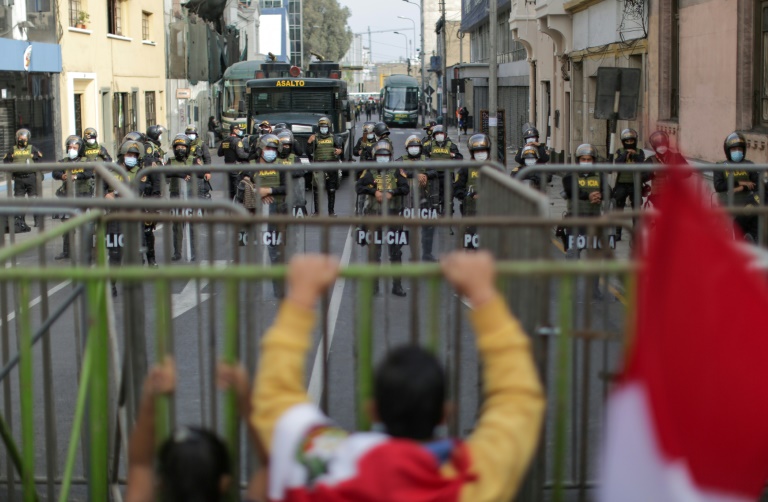Far-left trade unionist Pedro Castillo took a razor-thin lead Monday as the final votes were tallied in a neck-and-neck battle with populist Keiko Fujimori for the presidency of crisis-hit Peru.
With just over 94 percent of ballots counted, Castillo, 51, was narrowly ahead of his rival with 50.1 percent compared to her 49.8 percent, though there could still be a long wait for the final outcome.
Fujimori, 46, had led in early counting, but rural school teacher Castillo has gained ground as votes from Peru’s rural areas — his stronghold — came in from Sunday voting in the country battered by years of political turmoil.
The count may take days to finalize, with more than a million expat votes yet to be processed.
Amid the uncertainty, the Lima stock market plunged 7.22 percent and the sol dropped to a record low 3.94 against the US dollar.
Whoever wins the deeply ideological battle between left and right will take leadership of a nation battered by recession and the world’s worst coronavirus fatality rate with more than 186,000 deaths among its 33 million population.
Peruvians will also be looking for stability after going through four presidents in three years. Seven of their last 10 leaders have either been convicted or are under investigation for corruption.
Fernando Tuesta, former boss of Peru’s ONPE electoral body, told AFP it would be “difficult” to finalize the count by Monday and it was normal for counting to slow down as the last ballots trickle in from rural areas and abroad.
Both candidates have undertaken to respect the outcome.
Castillo on Sunday urged his supporters to “stay calm”, explaining from Tacabamba in the northern Cajamarca region where he lives that “they haven’t counted our votes yet.”
Fujimori, running her third presidential race, said: “Seeing how small the gap is, it is essential to maintain prudence and I say that for all Peruvians.”
– Polar opposites –
Castillo caused an upset by topping the first round of voting in April, with Fujimori in second place.
The relatively-unknown teacher was consistently ahead of his rival, though narrowly so, in the latest opinion polls before Sunday’s vote that comes at a crucial time for the country.
Two million Peruvians have lost their jobs during the pandemic and nearly a third now live in poverty, according to official figures.
The candidates have polar-opposite recovery plans.
Fujimori, the daughter of corruption-convicted and jailed ex-president Alberto Fujimori, backs a neoliberal economic model of tax cuts and boosting private activity to generate jobs.
Castillo has pledged to nationalize vital industries, raise taxes and increase state regulation.
Favored by the business sector and middle classes, Fujimori — her bastion the capital Lima — sought to portray Castillo as a communist threat, warning Peru risked becoming a new Venezuela or North Korea.
Rural-based Castillo, in turn, pointed to the Fujimori family’s history of corruption scandals.
Keiko Fujimori is under investigation over campaign funding in her 2011 and 2016 presidential bids.
Apart from corruption charges, her jailed father, 82, has been found guilty of ordering two massacres by death squads in 1991 and 1992 while president.
He is being probed over the forced sterilization of hundreds of thousands of poor, mostly indigenous women during his final four years in power.
“If Keiko is eventually elected, you can’t forget that this 50 percent is not her real support but rather a reaction from an electorate that is afraid of what her opponent represents,” political scientist Jessica Smith told AFP.
– Peru’s ‘first poor president’ –
Castillo “would be the first poor president of Peru,” added analyst Hugo Otero. The leftist candidate has vowed to forego a presidential salary and live on his teacher’s wages.
Whoever wins will have a hard time governing as Peru’s Congress is fragmented.
Castillo’s Free Peru is the largest single party, just ahead of Fujimori’s Popular Force, but without a majority.
“It won’t be easy (for Fujimori) given the mistrust her name and that of her family generates in many sectors. She’ll have to quickly calm the markets and generate ways to reactivate them,” said Smith.
But if Castillo triumphs, he will have to “consolidate a parliamentary majority that will allow him to deliver his ambitious program,” she said.
In either case, “it will take time to calm the waters because there is fierce polarization and an atmosphere of social conflict,” added analyst Luis Pasaraindico.
At the height of a political storm in November last year, unleashed by more corruption claims, Peru had three different presidents in just five days.
The new president will take office on July 28, replacing centrist interim leader Francisco Sagasti.










